 Free SHL Practice Test - Sample Questions & Answers for Your Exam [2025]
Free SHL Practice Test - Sample Questions & Answers for Your Exam [2025]
SHL is one of the largest providers of job-applicant screening tests in the UK and worldwide, conducting dozens of test types for hundreds of employers.
On this page, you can try a free SHL practice test (with answers), including questions from the most common SHL exams:
Jump to: Numerical | Deductive | Inductive | Verbal | Checking | Mechanical | Personality | Related Pages
If you have already received an invitation to the assessment, we recommend checking which specific tests you are invited to and focusing your practice on them.
Common SHL Tests include:
- The Interactive General Ability (Verify G+) Test - all 3 sections: SHL Numerical, SHL Inductive, and SHL Deductive reasoning
- SHL Verbal Reasoning Test
- SHL Checking Test
- SHL Mechanical Comprehension Test
- The OPQ32 Personality Questionnaire
SHL Numerical Reasoning Practice - Interactive
Numerical Question #1
Using the given information, determine how many likes per day each post received and what percentage of the total likes was given to each.
Likes on Facebook
• Two net personalities shared posts on Facebook.
• The total number of likes for both posts increased by 15% from the first day to the second, reaching 575,000 likes on Day 2.
• Post B was given 150,000 likes on Day 1.
• The number of likes for Post A increased by eight precentage points from day one to day two.
Answer the question by tweaking the following graph so that it reflects the correct information:
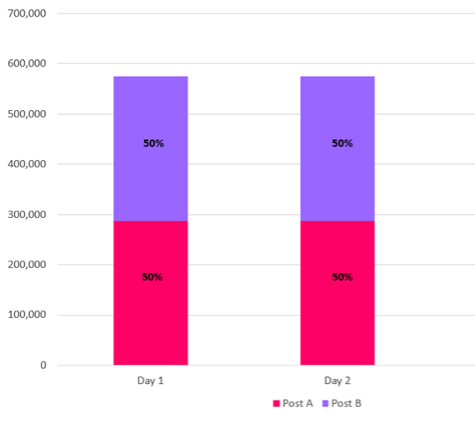
Answer & Explanation
This is the correct division:
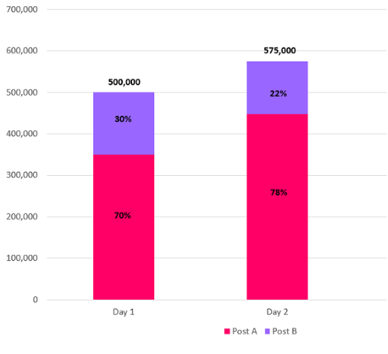
Start by organizing the information presented to you in a table to ease the calculation process.
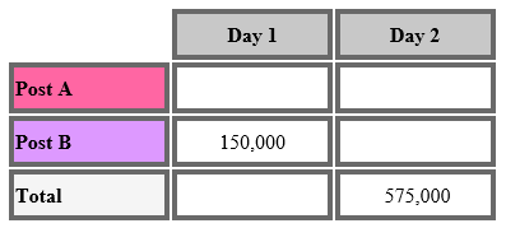
575,000 is the total number of likes on Day 2, which is 115% of the likes on Day 1. To calculate these numbers, you can use the Rule of Three.
To use the Rule of Three, you need three known values: two that are proportional to one another and a third. From there, you can figure out the fourth unknown value (usually named x). The Rule of Three formula is:

The total number of likes on Day 2 is 575,000. Hence:
115% -> 575,000
100% -> Day 1
Day 1 = (100*575,000)/115 = 500,000 -> There were 500,000 total likes on Day 1.
Insert the new information into the table and complete the rest of the tabs:
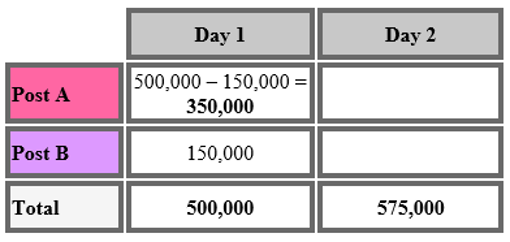
Now that you have the total likes on Day 1 and their division between posts A and B, you can transform them into percentages.
% Post A on Day 1 = (350,000/500,000) * 100 = 70%
Now that Day 1 is completely mapped, you can move forward to Day 2.
According to the last statement, the number of likes for Post A increased by eight percentage points each day. Note: percentage points are simple arithmetic differences. One Percentage Point = 1%. An increase of 8 percentage points means simply adding 8 to the previous percentage number.
This means that the percentage of Post A out of the total number of likes on Day 2 is 70 + 8 = 78%
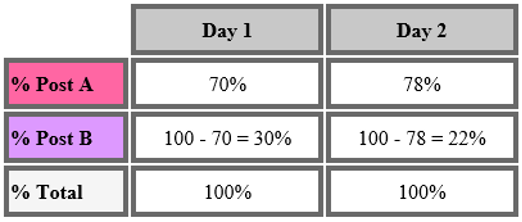
Numerical Question #2
There are 77 engineers from four different fields working in your high-tech company. They are paid a 12% bonus on their annual salary.
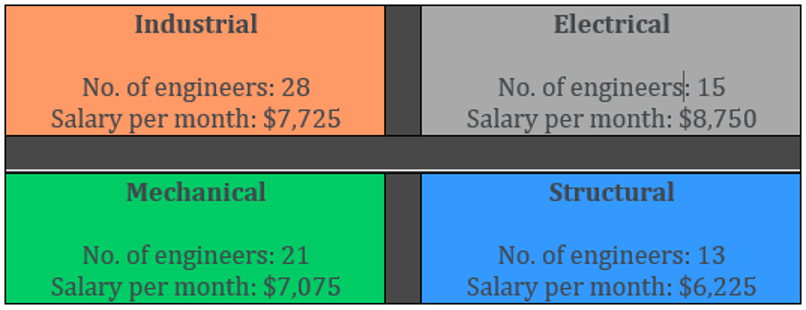
Determine the annual salary (including bonuses) paid to the engineers in each field as a percentage of all the engineers (rounding to the nearest whole number only at the last step).
Answer & Explanation
This pie graph represents the correct answer:
To solve this question, you need to calculate the yearly salary of all engineers in total and the yearly salary by field. Then you can calculate the proportion between them in percentages.
You can calculate the yearly salary by field using the formula below:
Total Yearly Salary by field: No. of employees * Monthly salary per employee * No. of months (12) * Bonus (extra 12%)
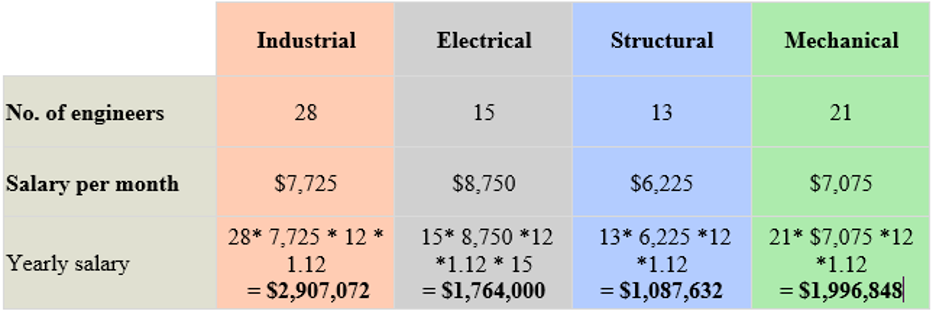
Total sum of salaries of all four fields = $2,907,072 + $1,764,000 + $1,996,848 + $1,087,632 = $7,755,552
Calculate the percentage of each field's yearly salary out of the total yearly salary:

The examples provided represent two of the five interactive numerical questions in the SHL Tests: Column Chart and Pie Chart. Other types of questions are Line Charts, Number Ranges, and Ranking. The questions vary in difficulty level, graphics, and required prior knowledge.
The questions in the numerical reasoning section require straightforward calculations and reading of graphs and tables. However, what can you do if a question requires common logic, attention to detail, and the ability to infer from the given information? We now move on to the SHL Deductive Reasoning section.
What is the Best Way to Study for the SHL Tests?
The difficulty of getting a high score on the SHL test stems from the complexity of the questions and the relatively short time to answer them. The time pressure is most prominent in the interactive version. For example, on the SHL Verify Interactive (G+) numerical section, you must carry out three challenging stages of calculations in just 1.48 minutes to get to the correct answer!
Moreover, you must create the solution yourself and cannot guess from pre-given options. Therefore, more than practising and improving your numerical and logical skills, intelligent time management is crucial for acing the SHL test. Our experience has taught us that the closer the practice is to the actual test, the more significantly it improves your score.
In addition to taking actual test simulations, our SHL PrepPack offers interactive study guides for every subject to teach you solving techniques and time-saving strategies. Through these specialized prep materials, you will get used to the pressure and see clear improvements until you get a high score to stand out above the competition.
SHL Deductive Reasoning Practice - Interactive:
Deductive Question #1
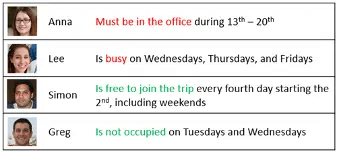
A team of employees is trying to schedule a day trip together the following month. Select all possible weekdays in the next month when all team members can join the trip.
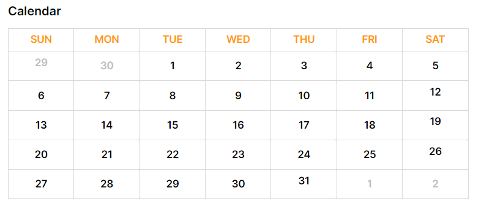
Answer & Explanation
The correct answer is the 29th of the month:
Let’s break down the statements step by step:
- Turn general negative statements into positive phrasing:
Lee: is available on Mondays and Tuesdays.
Together with the statement we already have:
Greg: is available on Tuesdays and Wednesdays.
There is only one weekday that is overlapping for Greg and Lee –Tuesday. - Extract relevant information from other statements:
Simon is free every fourth day, starting the 2nd. Counting every 4th day (2-3-4-5., 6-7-8-9, ….), the only Tuesday available is the 29th.
Anna will not be available between the 13th-20th. This period includes one Tuesday (the 15th) which doesn’t overlap with Simon’s only free Tuesday. - Choose the dates:
The only date all team members could go on a day trip is the 29th.
Deductive Question #2

Mark the correct badge for each employee, sorting them in their order of arrival at the office, from 1 (first to arrive) to 6 (last to arrive).

Answer & Explanation

Let’s break down the statements step by step:
- Start with the fixed-order statements:
Dona is the first to arrive at the office. - Second, combine statements that relate to each other:
David arrives right after Samira but before Lian. Therefore, address Samira, David, and Lian as one unit:
Samira -> David -> Lian
Noah arrives right after Jim, but sooner than David:
Jim -> Noah
Since Samira, David, and Lian act as one unit (they arrive right after the other), then if Noah arrives sooner than David, he arrives sooner than Samira as well:
Jim -> Noah arrive earlier than Samira -> David -> Lian
Note that Jim and Noah also act as one unit.
Adding Dona to the list:
Dona - Jim -> Noah - Samira -> David -> Lian
Since David arrives before Lian (even if it doesn't say "right before"), you can conclude that Lian is the last to arrive at the office. There is no other order that fits with all the statements.

The provided examples are two of the three types of interactive deductive questions that can be found in the SHL exams. The examples are Calendar and Ordering questions, with Daily Schedule questions remaining. These questions require test takers to deduce details from different types of information and apply them in a way that is commonly encountered in everyday work.
With approximately 1.5 minutes to answer each question, it is highly recommended to become familiar with the different types of questions and practice. Guides, SHL practice questions of all types, and simulations that mirror the SHL interactive Deductive test, can be found as part of our full SHL general ability Preparation pack, Rolls Royce Assessment Test or the SHL Verify G+ interactive PrepPack.
The final section of the SHL Interactive General Ability Test is the SHL Inductive Reasoning Test, which also requires logical thinking but assesses different skills than the Deductive test. The Inductive test evaluates problem-solving and pattern-recognizing abilities using abstract questions and visual figures, unlike the Deductive test which focuses on deducing details from information. Let’s start:
Are You in Search of Practice Tests for the SHL Assessment?
JobTestPrep's Preparation Course features 110 practice tests with over 1000 questions, covering major SHL Tests including: Verify G+, Numerical, Inductive, Deductive, Verbal, and more.
Join our family of success, thousands strong.
SHL Inductive Reasoning Practice - Interactive:
Inductive Question #1
Complete the following sequence:
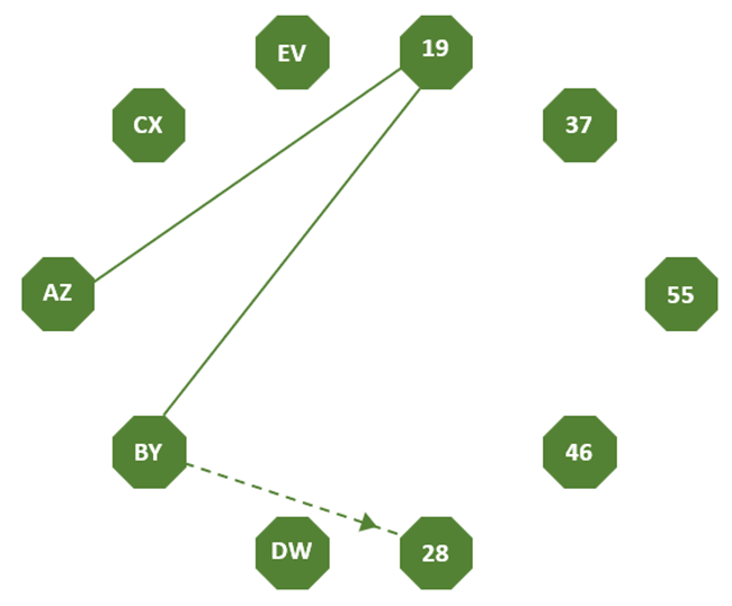
Answer & Explanation

The question asks you to find the logical rules applied between these nodes and complete the sequence, which started with the connected nodes: AZ -> 19 -> BY -> 28.
Logical Rule #1: The sequence starts with a node containing letters, which connects to a node containing numbers, which then connects once again to a node containing letters. The final sequence will stick to this pattern: Letters -> Numbers -> Letters -> Numbers, and so forth.
Logical Rule #2: The main “theme” of this question is opposite extremes:
• A and Z are the first and last letters of the alphabet.
• 1 and 9 are the first and last digits in the base-10 system (excluding 0 which does not appear in the question).
With each connection, these letters and digits are ‘getting closer’ to each other:
• B and Y – are the second and the second-to-last letters of the alphabet.
• 2 and 8 – are the second and second-to-last digits (presented in this question).
Following these rules, the next nodes should be the third and fourth letters or digits.
Final answer: AZ -> 19 -> BY -> 28 -> CX -> 37 -> DW -> 46 -> EV -> 55
Inductive Question #2
Fill in the colours of the hexagram to create the next figure in the series / Choose the next image in the sequence:
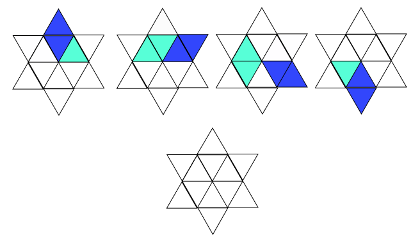
Answer & Explanation
The correct answer is:
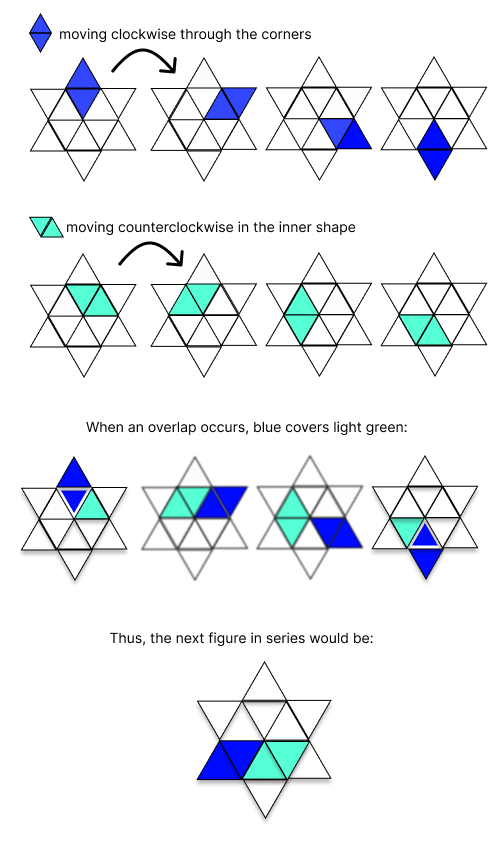
The examples provided represent two of the three interactive inductive questions in the SHL Tests. The examples are Alphanumeric Sequences and Next in Series questions, with Rules Combination questions remaining. The questions require you to recognize specific patterns and decide how to continue them using different formats and graphics.
As there's only about one minute per question, which is the least amount of time among all the SHL Interactive question types, practice and experience with Inductive questions are essential for success. Guides, practice questions for all three inductive question types, and simulations that mirror the SHL interactive Deductive test can be found in full SHL general ability Preparation pack.
The SHL Interactive General Ability Verify G+ test is like no other, as the answering methods require moving pieces on the screen, choosing dates from a calendar, stretching lines, and more. Our practice tests simulate the interactive properties of the SHL test as closely as possible and provide guides and detailed solutions to help you improve your solving process and overall performance.
SHL General Ability Verify G+ Interactive Test is the most common form of SHL assessment exam. However, other sections, non-interactive, may be included partially or entirely in the SHL Tests:
SHL Verbal Reasoning Test
Verbal Question #1
Lots of people start running in their 30s or older, and it is one of the few sports in which you can improve with age. One example is the great Jack Foster, a self-styled "ancient marathoner”, who ran for the first time at the age of 32, and by the age of 40 found himself picking up a silver medal at the Christchurch Commonwealth marathon in 1974.
Of course, while we all may hold secret hopes of uncovering a latent talent, most of us are unlikely to progress to an elite level. But, whether we like to compete on a weekend or prefer to go on solitary excursions through the countryside, the message is that age is far less of a barrier in running than it is in other sports. With running, even if taken up later in life without any previous experience, it really is realistic to expect improvement with age.
Answer the following questions based on the text above:
1. Which of the following best summarizes the main idea of the second paragraph?
A. It describes people's hopes to uncover their talents.
B. It compares solitary runners to competitive runners.
C. It highlights the message that running has no age.
D. It emphasizes the importance of running when one is older.
Answer & Explanation
To answer this question, we must read paragraph 2 carefully. Once we do, we can see that the answer is obvious in the paragraph, starting with the words: ” The message is…” The message of this paragraph is that running has no age and therefore the correct answer is C.
2. Based on the text, which of the following is definitely correct?
A. Many people start running at an older age.
B. Older runners generally receive more medals.
C. More people prefer to compete than to run alone.
D. Older runners are faster than younger runners.
Answer & Explanation
In order to conclude which of the statements is definitely correct, we must locate them in the text and find which of them is explicitly mentioned there:
- Answer choice (a) - The passage begins with the words: ”Lots of people start running in their 30s or older…”, corresponding with this answer choice and confirming it as correct.
- Answer choice (b) - While it is true that Jack Foster received a medal for his running achievements, we don't actually know whether older runners receive more medals than younger runners. This is not necessarily a correct statement.
- Answer choice (c) - The second paragraph describes two types of runners: people who like to participate in races and those who like to run without competing. It does not, however, compare the number of runners per category. Thus, this answer choice is not necessarily correct.
- Answer choice (d) - Again, similar to answer choice (b), we do not have information regarding the qualifications of younger versus older runners, and therefore this answer choice is also not necessarily correct.
Therefore, answer choice (a) is the correct answer.
Verbal Question #2
Life in a city constitutes both a threat and an opportunity for wild animals. This contradictory state in urban environments is especially apparent in the life of birds. Comparing the survival rates of urban birds with birds in rural areas will show that the birds in the urban environment live in a paradox. On the one hand, it is considerably tougher for birds to reach maturity in a city. On the other hand, if they survive their first year, the negative effects decrease, and the birds seem hardier.
Answer the following questions based on the text above:
1. Mature birds in urban areas are more susceptible to the bad influences of the city than immature birds.
A. True
B. False
C. Cannot Say
Answer & Explanation
The answer is: False.The passage states: 'On the one hand, it is considerably tougher for birds to reach maturity in a city. On the other hand, if they survive their first year, the negative effects decrease, and the birds seem hardier'. It can be concluded that immature birds are affected badly by the city, but if they make it through, when they are mature, they are stronger and can endure the difficult situations in the city. Mature birds are less susceptible to the bad influences of the city, not more.
JobTestPrep’s SHL Test Practice
Our all-inclusive SHL PrepPack features three simulations for the SHL Verify Interactive (G+), each with 24 SHL practice test questions that you will try to complete in 36 minutes – just like in the actual test. The order of the questions, difficulty, and time limit are all precisely the same as the SHL test and come with in-depth explanations.
With our SHL preparation pack, available for only £39, you can ensure you are at your best when you take the SHL assessment and get the high score you deserve.
Good prep, I think it helped me get a good grade on the test
I practiced only for a few hours but still worth the investment, I got a quite good score. Questions were similar and level of difficulty as well (In fact I have the impression the real test was actually easier vs the practice) for reference I did the SHV general ability non interactive
⭐⭐⭐⭐⭐
Raquel, applied for a Senior Manager position.
Good preparation
Really good preparation for my test: lots of challenging exercises, that made me much more confident for the actual assessment
⭐⭐⭐⭐⭐
Carlos, applied for a Finance Manager position.
Helped me land the job
Thanks, guys! You've helped me land the job! :) I would advise anyone to prepare properly using these tests.
⭐⭐⭐⭐⭐
Anca, applied for a Marketing position.
The SHL Verbal Reasoning section includes Reading Comprehension, as well as Verify Verbal Reasoning questions. As the examples show, verbal questions require thorough reading, verbal abilities, understanding of context, and summarization techniques. Some of the texts may be longer, contain more details, or be at a higher level of English. The questions and answers may vary – not only in the questions themselves but also in the format. Comprehensive practice, including guides and different types of questions, can be found in our SHL Verbal Reasoning PrepPack.
Next, we’ll be looking at another non-interactive section, where your attention to detail under time pressure is assessed. This is the SHL Checking Test:
SHL Checking Test:
For each question, determine which answer is the same as the question in the shortest timespan possible:
Checking Question #1
ACTHRJ
a. ACTHJR
b. ACTHRJ
c. ATCHRJ
d. ACTRHJ
Answer & Explanation
The correct answer is (b).
Checking Question #2
6754651
a. 6756451
b. 6754615
c. 6754651
d. 6574651
Answer & Explanation
The correct answer is (c).
Checking Question #3
PKYTVIUREW
a. PKYTVIUERW
b. PKYVTIUREW
c. PKYTVIRUEW
d. PKYTVIUREW
Answer & Explanation
The correct answer is (d).
The SHL Checking section includes a very straightforward type of question. However, questions may become increasingly longer and with less time to answer as the tests progress. Comprehensive practice, including increasing difficulty, can be found in our All-inclusive SHL Preparation Pack.
The next section is relevant to the positions that include mechanical orientation. If your desired position is relevant, or you are not sure about the sections yet, move on to the SHL Mechanical Comprehension Test:
Create Your Custom Assessment Prep Kit
Job-seeking can be a long and frustrating process, often taking months and involving numerous pre-employment tests and interviews. To guide you through it, we offer a Premium Membership.
Choose 3 Preparation Packs at 50% discount for 1, 3, or 6 months.
SHL Mechanical Comprehension Test
Mechanical Question #1
In which direction will the light blue wheel spin?
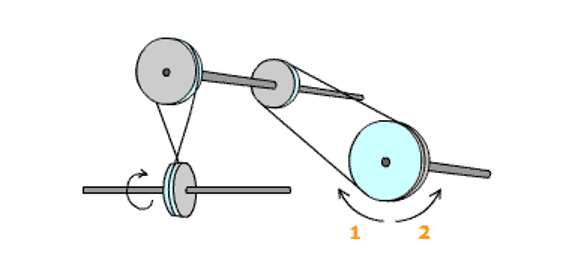
a. 1
b. 2
c. Will not spin.
Answer & Explanation
The correct answer is (b).
We will mark the wheels as 1,2,3 and 4. See the picture below.
Wheel 1 rotates clockwise, thus moving the band in the direction shown by the green arrows. That movement will, in turn, rotate wheel 2 anticlockwise.
Since wheels 2 and 3 are connected by a band, wheel 3 will also rotate anticlockwise.
Since wheels 3 and 4 are connected by a band, wheel 3 will also rotate anticlockwise.
Mechanical Question #2
What would the total resistance be if a resistor was added in parallel to the following circuit?
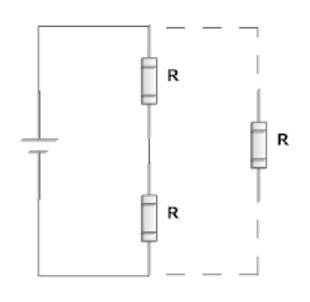
a. 3R
b. 2R/3
c. 3R/2
d. Remain the same
Answer & Explanation
The correct answer is (b).
We shall use this question as a pretence to clarify how total resistance is calculated in general.
Series Connection:
Resistors are said to be connected in series if the currents through each of the resistors are equal. For example, the same current must flow through the two resistors in the middle of the figure.
If resistors R1, R2, ..., Rn are connected in series, then their total resistance Rt can be calculated using the formula
Rt = R1 + R2 + ... + Rn
This means we can replace the resistors with a single resistor with resistance Rt and the rest of the circuit will not be affected.
In this case, we can replace the two resistors in the middle with Rs = R + R = 2R.
Parallel Connection:
Resistors are said to be connected in parallel if the voltages across each of the resistors are equal. For example, after connecting the resistors in the middle in series, there must be the same voltage across the resistor on the right and the new resistor Rs in the middle.
If resistors R1, R2, ..., Rn are connected in parallel, then their total resistance Rt can be calculated using the formula
1/Rt = 1/R1 + 1/R2 + ... + 1/Rn
Again, we can replace the resistors with a single resistor with resistance Rt and the rest of the circuit will not be affected.
In this case, we can replace the two resistors in the middle with
1/Rt = 1/Rs + 1/R = 1/2R + 1/R = 3/2R
Rt = 2/3R.
💡 Solving Tip: The formulas show that adding a resistor in series will always increase the total resistance, while adding one in parallel (as suggested here) will always decrease the total resistance.
Mechanical Question #3
On which of the chains is more tension being exerted?
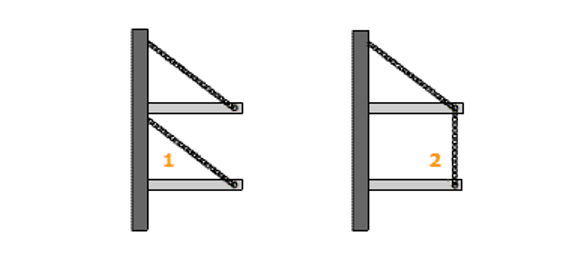
a. 1
b. 2
c. Identical tension
Answer & Explanation
The correct answer is (a).
This question is based on the principle of dividing a diagonal force into its horizontal and vertical components and examining them individually.
Option 1 demonstrates a situation where a substantial portion of the energy is wasted on pinning the shelf to the wall. This is the vertical component of the chain’s tension. In addition, chain 1 must produce the same force needed to hold up the shelf as chain 2, or in other words, produce the same amount of vertical tension. Therefore, more tension is being exerted on chain 1.
The examples provided here represent general aspects of the SHL Mechanical Comprehension Test. The questions may include several basic mechanics and electricity subjects. To ensure you are well familiar with them read guides and practice a variety of mechanical questions as part of our All-inclusive SHL Preparation Pack.
Finally, some SHL assessments will require a personality questionnaire to create a general profile regarding different traits required for different positions. The assessment provided by SHL is called the OPQ32 Test:
SHL OPQ32 Test
Occupational Personality Questionnaire Sample #1
Choose which statement is most accurate or typical of you and which is least like you:
- I aspire to be the victor
- I can produce fresh ideas effortlessly
- I advise others on what action to take
How to answer this question
While there is no absolute answer, your responses add up to a total score for each of a set of traits and attributes. You want to aim for a high score on traits that are considered important in the type of role you are applying to. For leadership roles, statement (b) should be ranked most like me, while statement (a) should be ranked least like me.
Occupational Personality Questionnaire Sample #2
Choose which statement is most accurate or typical of you and which is least like you:
- I want to stay silent about my accomplishments
- I like executing my approach
- I am proud to be in charge
How to answer this question
As with the previous question, the answers reflect different traits. For leadership roles, statement (c) should be ranked most like me, while statement (b) should be ranked least like me.
An assessment such as the OPQ32 (SHL occupational personality questionnaire) evaluates different aspects of your personality, predicting how well you will fit into a potential role - socially, professionally, etc. While honesty is always recommended when answering personality questions, understanding the test and the way you are perceived by different answers is highly recommended before taking it. In our SHL OPQ32 Preparation Pack, you'll find the complete test with detailed job-specific feedback and a comprehensive guide.
Pass Your SHL Test
Our All-Inclusive SHL Preparation pack has 70+ practice tests covering every subject on this page:
- A unique, full interactive SHL test coverage (Verify G+), which you won't find anywhere else.
- SHL Numerical Reasoning Test
- SHL Verbal Reasoning Test
- Other SHL Tests (Inductive, Deductive, Mechanical, and Checking)
- Guides and extra practice material.
More SHL Tests
We hope you have enjoyed this superb free SHL practice test and feel more ready for your upcoming SHL test!
If your test didn't appear on this page, don't lose hope, we can still help you.
Try one of the following:
SHL Numerical Reasoning Test Preparation | SHL Calculation Test Preparation | SHL Situational Judgement Test Preparation | SHL Reading Comprehension Test Preparation | SHL Checking Test Preparation | SHL Excel Test Preparation | SHL Worldwide
Looking to practice for a different test? Check out our preparation for Abstract Reasoning Tests, Psychometric Tests, SHL Numerical Test, and more.
Additional Major Test Providers
More Free Practice
We at JobTestPrep find the assessment tests world highly diverse and fascinating. If you are looking to deepen your knowledge in the aptitude tests world, or you want some extra practice before your test, we've got you covered!
Check out these fantastic free practice tests (all are completely free):
Free Aptitude Test | Free Psychometric Test | Free Numerical Reasoning Test | Free Verbal Reasoning Test | Free Cognitive Test | Free Critical Thinking Test | Free Abstract Reasoning Test | Free Spatial Reasoning Tets | Free Personality Test | Free Inductive Test | Free Mechanical Reasoning Test


